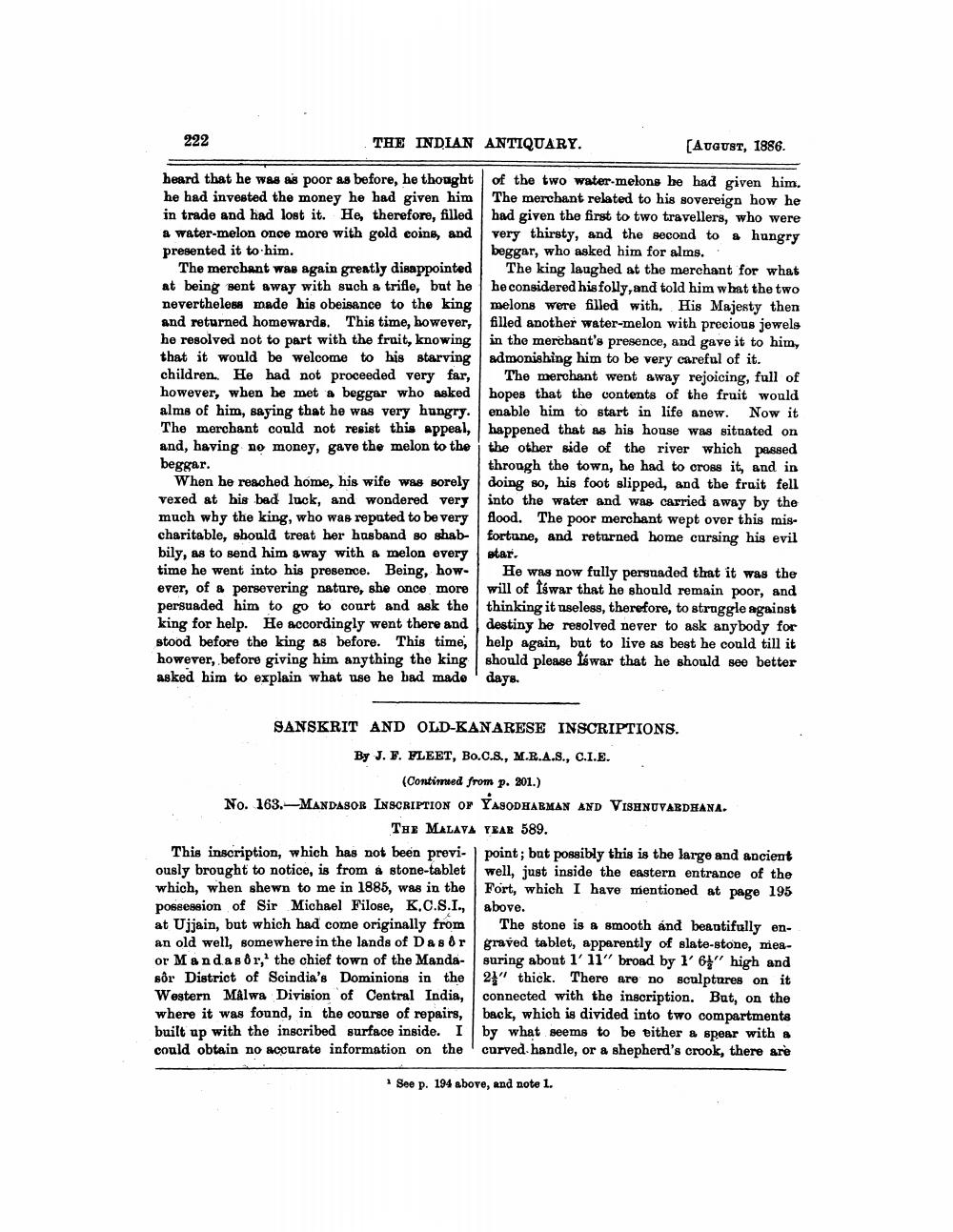________________
222
THE INDIAN ANTIQUARY.
(AUGUST, 1886.
beard that he was as poor as before, he thought of the two water-melons he had given him. he had invested the money he had given him The merchant related to his sovereign how he in trade and had lost it. He, therefore, filled had given the first to two travellers, who were a water-melon once more with gold coins, and very thirsty, and the second to hungry presented it to him.
beggar, who asked him for alms. The merchant was again greatly disappointed | The king laughed at the merchant for what at being sent away with such a trifle, but he he considered his folly, and told him what the two nevertheless made his obeisance to the king melons were filled with. His Majesty then and returned homewards. This time, however, filled another water-melon with precious jewels he resolved not to part with the fruit, knowing in the merchant's presence, and gave it to him, that it would be welcome to his starving admonishing him to be very careful of it. children. He had not proceeded very far, | The merchant went away rejoicing, full of however, when he met a beggar who asked hopes that the contents of the fruit would alms of him, saying that he was very hungry. enable him to start in life anew. Now it The merchant could not resist this appeal, happened that as his house was situated on and, having no money, gave the melon to the the other side of the river which passed beggar.
through the town, he had to cross it, and in When he reached home, his wife was sorely doing so, his foot slipped, and the fruit fell vexed at his bad luck, and wondered very into the water and was carried away by the much why the king, who was reputed to be very flood. The poor merchant wept over this mischaritable, should treat her husband so shab- fortune, and returned home cursing his evil bily, as to send him away with a melon every star. time he went into his presence. Being, how. He was now fully persuaded that it was the ever, of a persevering nature, she once more will of fŚwar that he should remain poor, and persuaded him to go to court and ask the thinking it useless, therefore, to struggle against king for help. He accordingly went there and destiny be resolved never to ask anybody for stood before the king as before. This time, help again, but to live as best he could till it however, before giving him anything the king should please Iswar that he should see better asked him to explain what use he bad made' days.
SANSKRIT AND OLD-KANARESE INSCRIPTIONS.
By J. F. FLEET, BO.C.S., M.R.A.S., C.I.E.
(Contime from p. 201.) No. 163.-MANDASOR INSCRIPTION OF YASODHARMAN AND VISHNUVABDHANA.
THE MALAVA TEAB 589. This inscription, which has not been previ- | point; but possibly this is the large and ancient ously brought to notice, is from a stone-tablet well, just inside the eastern entrance of the which, when shewn to me in 1885, was in the Fort, which I have mentioned at page 195 possession of Sir Michael Filose, K.C.S.I., above. at Ujjain, but which had come originally from the stone is a smooth and beautifully enan old well, somewhere in the lands of Das dr graved tablet, apparently of slate-stone, meaor Mandas or, the chief town of the Manda- suring about 1' 11" broad by 1' 6" high and Bôr District of Scindia's Dominions in the 21" thick. There are no sculptures on it Western Malwa Division of Central India, connected with the inscription. But, on the where it was found, in the course of repairs, back, which is divided into two compartments built up with the inscribed surface inside. I by what seems to be either a spear with a could obtain no aocurate information on the curved handle, or a shepherd's crook, there are
See p. 194 above, and note 1.




